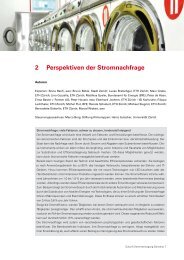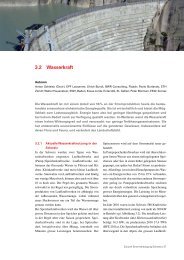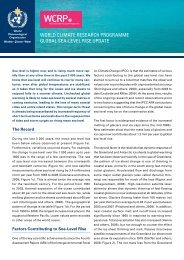Global Change Abstracts The Swiss Contribution - SCNAT
Global Change Abstracts The Swiss Contribution - SCNAT
Global Change Abstracts The Swiss Contribution - SCNAT
Create successful ePaper yourself
Turn your PDF publications into a flip-book with our unique Google optimized e-Paper software.
186 <strong>Global</strong> <strong>Change</strong> <strong>Abstracts</strong> – <strong>The</strong> <strong>Swiss</strong> <strong>Contribution</strong> | Human Dimensions<br />
08.1-388<br />
Sink or Swim? Water security for growth and<br />
development<br />
Grey D, Sadoff C W<br />
India, Sri Lanka, Switzerland<br />
Economics , Social Sciences , Water Resources<br />
Achieving basic water security, both harnessing<br />
the productive potential of water and limiting<br />
its destructive impact, has always been a societal<br />
priority. To capture this duality, water security<br />
is defined here as the availability of an acceptable<br />
quantity and quality of water for health,<br />
livelihoods, ecosystems and production, coupled<br />
with an acceptable level of water-related risks to<br />
people, environments and economies. This paper<br />
looks broadly at those countries that have<br />
achieved water security, the paths they chose and<br />
the costs they paid, and those countries that have<br />
not achieved water security and how this constrains<br />
economies and societies. It defines three<br />
typologies: countries that have harnessed hydrology,<br />
those hampered by hydrology and those that<br />
are hostage to hydrology. It finds that countries<br />
remaining hostage to hydrology are typically<br />
among the world’s poorest. <strong>The</strong>y face “difficult”<br />
hydrologies often characterized by high inter- and<br />
intra-annual rainfall and runoff variability, where<br />
the level of institutional and infrastructure investment<br />
needed is very high and the ability to invest<br />
is low. This paper seeks to capture the dynamics<br />
of achieving water security in a hypothetical water<br />
and growth “S-curve”, which illustrates how a<br />
minimum platform of investments in water institutions<br />
and infrastructure can produce a tipping<br />
point beyond which water makes an increasingly<br />
positive contribution to growth and how that tipping<br />
point will vary in different circumstances.<br />
As there are inevitable trade-offs, achieving water<br />
security is never without social and environmental<br />
costs; in some countries these are significant,<br />
often unforeseen and even unacceptable. This<br />
brief analysis suggests that the only historically<br />
demonstrated path to achieving water security<br />
at the national level has been through investment<br />
in an evolving balance of complementary<br />
institutions and infrastructure, but that lessons<br />
exist for following this basic path in more sustainable<br />
and balanced ways. Insights are provided for<br />
balancing and sequencing investments, adapting<br />
to changing values and priorities, and pushing<br />
down the social and environmental costs. <strong>The</strong><br />
paper concludes that most water-insecure countries<br />
today face far greater challenges than those<br />
that achieved water security in the last century<br />
and are wealthy countries today. <strong>The</strong>y face more<br />
difficult hydrologies and a greater understanding<br />
of and therefore greater responsibility for, the social<br />
and environment trade-offs inherent in water<br />
management. As the costs of poor countries not<br />
achieving water security, in terms of human suffering,<br />
sustained poverty, constrained growth and<br />
social unrest, would be very high, achieving water<br />
security is a challenge that must be recognized<br />
and must be met.<br />
Water Policy, 2007, V9, N6, pp 545-571.<br />
08.1-389<br />
Carbon constraints in the fourteenth and<br />
twenty-first centuries<br />
Hoffmann V, Busch T<br />
Switzerland<br />
Economics , History<br />
Journal of Industrial Ecology, 2007, V11, N3, SUM,<br />
pp 4-6.<br />
08.1-390<br />
Assessing psycho-social effects of participatory<br />
landscape planning<br />
Höppner C, Frick J, Buchecker M<br />
Switzerland<br />
Social Sciences<br />
Participation has become an important issue in<br />
landscape planning. Within the relevant literature,<br />
an increasing number of authors emphasise<br />
the meaning of psycho-social effects such as the<br />
building of trust and engagement for planning<br />
projects. Yet, empirical studies examining psycho-social<br />
effects of participatory techniques in<br />
landscape planning are still an exception and are<br />
often conceptually and methodologically limited.<br />
<strong>The</strong> present paper addresses these gaps by adapting<br />
a mixed method design consisting of repeated<br />
measurement (n = 35) and qualitative interviews<br />
(n = 11). In the course of a municipal Landscape<br />
Development Concept (LDC) in Switzerland, short-<br />
term effects were assessed regarding participants’<br />
(a) trust in other persons involved, (b) confidence<br />
in the outcomes of the LDC, and (c) intention to<br />
participate. Significant changes were found on<br />
trust in involved persons and on the confidence<br />
in the general benefit of the LDC. <strong>The</strong> intention<br />
to participate did not change significantly. Information<br />
events had no significant effect on participants,<br />
whereas workshops had a significant effect<br />
on participants’ trust. Trust of workshop attendees<br />
decreased during the planning process, which<br />
may partly represent a shift from enthusiastic expectations<br />
to a more realistic view, and must not<br />
be regarded as a negative outcome, since it prevents<br />
participants from serious frustration. <strong>The</strong><br />
paper concludes that a long-term participation<br />
strategy, providing different participatory arenas

















